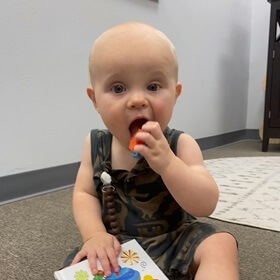
Just like building a house, the nervous system develops in phases. Kids develop that way too. So if your kiddo’s struggling with speech, sensory or social challenges, here are some of the developmental milestones that might have been missed.
If they are a little behind, we want to help. A lot happens between zero and 18 months of life to get a kiddo upright and walking that’s going to impact so much more when they get further down the road, especially as they start school. That’s when a lot more sensory info comes in when they’re expected to socialize and have developed speech.
0 to 4 Months – Autonomic Ease
The first phase is zero to four months, which is a time that is important because your baby is not doing anything motorized. They’re eating, sleeping, pooping, and just being pretty darn cute. That’s all we want them to do during that phase. We want them to be at ease, that autonomic processing system, while their brain’s working hard, their body’s learning to do all those new things and it’s doing that on autopilot.
If your child is struggling here, we want to get involved and help them with those things because what that autonomic ease ties to at that point is that sensory system. If they’re not comfortable going to the bathroom or eating and there’s a lot of reflux, that’s going to set their body up developmentally to struggle with the sensory system when it gets older.
4 to 10 Months – Motor building blocks
Secondly, when kids get past four months, that’s when we start wanting to see the motor building blocks. That’s when we want them to hold their head up a little bit more, learn how to sit, get up into that sitting position, and finally get their butt up under them and start to crawl.
This is important because that rolls into the building blocks that eventually lead to walking. All those little gross milestones that they’re hitting to get to walking helps ease their brain and not only their sensory system but also the systems that are going to work on comfortability with social, speech, and language development. If they get to step three, that motor gravity integration between 10 and 18 months, and they didn’t hit those milestones, they may not be comfortable walking.
10 to 18 Months – Motor Integration
That leads to number three because we think of 10 to 18 months as kiddos crawling and starting to get up the stairs. But when they really start to put their feet under them and walk, they’re not only moving from one place to another, there’s also a lot of integration going on in their brain. This is huge because you’ve probably heard from your pediatrician or read in a book that they have to walk comfortably before they can talk comfortably. Gravity and that movement help activate those higher levels of the brain to get them very comfortable with speech.
If you’re a mom or dad and you feel in your gut that your kiddo is behind in one of these three phases, or maybe you already knew they were struggling and you’re looking for something else to help, we would love to help! Please reach out to us at Family First Chiropractic. Every single kiddo is a little different, so what we want to do is get them checked and scanned.
That’s the technology we use in our office to be able to help see where their system might be stressed. That goes with that autonomic phase, those motor phases, and all of that development between zero and 18 months. That’s then going to help them to conquer the speech, sensory or social challenges they may be struggling with right now. We’ve helped thousands of kids with this throughout our community and we want to see your kiddo thrive in what can be those tough years between ages five and seven.

